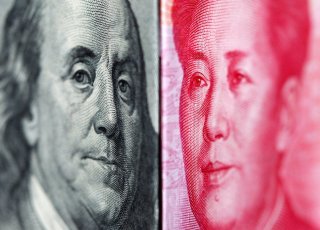The Biden Administration Is Right on China and Trade, but Must Aim Higher
The White House’s proposed solutions to address China's economic challenge stops at domestic redistribution and subsidies in a few areas, which won’t alter the grander structural market force to reverse the trend in Beijing’s favor.
Ultimately, it all comes down to what world we will live in—the ultimate end that justifies the means. The right question to ask is, should the United States continue to integrate with China, given this dire trend, and that China is likely to be an economically powerful Soviet Union? Trade shouldn’t be an end in and of itself. Trade should be at the center of U.S. grand strategy, which is oriented to ensure prosperity and security, and protects democratic values through concerted means.
A dire future awaits us should the current trend continue. As China integrates the global economy, more countries will find it too costly to “say no.” Malaysia and Singapore, even Germany and France, already downplay security concerns—careful not to upset the economic ties.
China is rallying countries around the world to “divide and rule,” bolstering autocracies in the fields of economy and technology. To nullify this trend, a bounded economic order may have to be the solution.
Democracies are never immune to external aggressions. Sullivan is right that traditional trade deals are insufficient for modern trade. Yet they are the exact problem that has the United States bleeding and resulting in China grabbing one sector after another.
Therefore, Washington should consider integrating market access provision, the biggest incentive, into the Indo-Pacific Economic Framework soon: there is growing Chinese influence on the framework’s members. Vietnam or Mexico is more complementary to the United States; neither can take away American jobs as massively and effectively. These frameworks are also powerful geopolitical instruments (so perhaps also reconsider the Comprehensive and Progressive Agreement for Trans-Pacific Partnership) that should include those who play by rules (especially emerging democracies). The $600 billion yearly imports from China, a huge political leverage and vulnerable dependency, requires friend-shoring at least, starting from strategic sectors. All in all, the key boils down to the U.S.-led trade bloc.
This is not to say that there is no cooperation or no co-existence. The West and the Soviet Union co-existed and cooperated on global issues during the Cold War. In fact, China is far ahead of the game on climate and already dominates the clean energy industries. Perhaps this is a useful place to start a conversation.
George Yean is a PhD candidate at the Department of Government of Harvard University. His research areas include international economy, technology, security, and grand strategy. He was trained in economics, political science, and engineering, and spent years working for high-tech companies such as Cisco. He can be reached at [email protected].
Image: Shutterstock.

